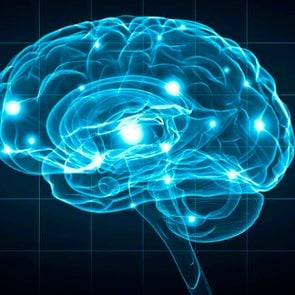Do Brain Games Actually Work?
Updated: Oct. 10, 2022
Brain games might have some benefits, but a crossword a day won't necessarily keep the brain doctor away, according to cognition experts.
Put down your Sudoku puzzles. While countless companies offer video games or puzzles that claim to boost your brain, many experts have their doubts that these types of games or puzzles are helpful. We asked some leading cognition professionals to set the record straight on the benefits of brain training games—and what else you can do to challenge and improve your mind.
What are brain games, anyway?
Brain training games ask players to complete tasks that practice specific cognitive skills like memory, attention, logic, and quick thinking. However, “there are differing views on what exactly constitutes a ‘brain game,'” says Adam Gazzaley, MD, PhD, cofounder of Akili Interactive Labs, a company that develops therapeutic video games. “Games themselves are a vast genre, similar to other umbrella terms like ‘sports’ and ‘drugs.'” Generally speaking, brain training activities can range from video games to puzzles to brain teasers, Dr. Gazzaley says.
Are the claims true? Do brain games actually work?
When it comes to our brains, very few things are black and white—including the effectiveness of brain games for adults. “The answer is always ‘it depends,’ says Susanne Jaeggi, PhD, a neuroscientist at the University of California at Irvine. “It depends on what games, who plays them and for what purpose, and how long/how often/how intensely they are being played.” Jeaggi’s team at the Working Memory and Plasticity Laboratory has found that the response of individuals to brain training are often mixed; while some participants show cognitive improvement, others do not. More research is needed, experts say, to find the exact formula for brain-boosting success.
What are the known benefits of brain games?
Studies have shown that playing certain games like solitaire or chess will make you better at the skills required to play those games, according to Jaeggi. But “the key thing to remember is that the skill you are getting better at is often incredibly specific,” says Jonathan King, PhD, program director at the National Institute of Aging (NIA). For example, “your ability to remember the cards is trainable, and having card memory skills could be helpful in a variety of card games, but won’t really do anything to improve your chess game, or necessarily do anything to help you learn how to memorize other things more generally.”
How does brain training make our brains faster and stronger?
Although brain games might not have the magical benefits you hoped for, they are not a total wash. Turns out, by playing a certain game over and over again, you are actually changing the way your brain works. “The benefits engendered by video game play are often the result of neuroplasticity, the ability of the brain to modify its structure, chemistry, and function in response to a challenge,” Dr. Gazzaley says. “This phenomenon serves as the neural basis of learning.” Translation: As you play brain games, your brain is adapting and rewiring itself to improve its performance. Don’t miss more surprising things that can rewire your brain.
Can brain games improve memory?
Research on the benefits of brain games for memory are not conclusive. Most experts agree, however, that memory-boosting games can improve the skills you practice while playing. For example, “if I repeatedly test your ability to remember briefly presented visual patterns, you will indeed get better at remembering those patterns,” King says. To enhance your recall ability more generally, King recommends the so-called “method of loci,” a technique that trains you to picture specific items on a mental list of objects you own in the corner, space, or room where they are placed.

Can brain games reduce age-related cognitive decline?
Age-related cognitive decline is another area where brain training games could actually have some positive effect, research shows. In a decade-long clinical trial conducted by Advanced Cognitive Training for Independent and Vital Elderly (ACTIVE), participants still benefited from the memory, reasoning, and speed of processing training five years later. Better yet, some people benefited from the speed of processing training 10 years later. Ready to get started? Practice these 15 habits by age 50 to save your brain at 80.
Can brain games prevent Alzheimer’s disease?
If you play brain games to try to stave off dementia and Alzheimer’s disease, challenging your mind with the occasional Sudoku puzzle may not be worth your time. “Unfortunately, that’s not a promise that we can make at this point (and probably never) given that Alzheimer’s disease results from several factors, only some of which are in our control,” Faeggi says. (You should stop believing these 15 myths about Alzheimer’s, too.)
What types of brain game programs work best?
Think twice before shelling out a lot of money for fancy brain training programs. There is not enough evidence for any of the currently available products to say which would work best, according to King. In fact, none of the major products that claim to improve your memory or intelligence have received FDA approval, and “only a very small number of products are currently pursuing FDA approval,” he says. Stick to these healthy habits proven to boost your brain health, instead.
What other ways to keep our brains sharp?
Faeggi recommends incorporating more activities that require active thinking and problem solving into your daily routine, such as playing a musical instrument or board game, participating in a book club, or volunteering. Other lifestyle factors—such as getting enough sleep, being physically active, and eating nutrient-rich foods—might boost your brain, as well. Studies supported by the NIA are attempting to determine exactly which activities or lifestyle choices can help brains stay sharp, King says.
What’s ahead for brain games and cognitive research?
Researchers continue to explore what changes in the brain are caused by training, how we could make these training effects larger, and how to apply the training to all aspects of our lives, King says. The future of brain-boosting video games appears promising, too. “I am optimistic that continued high-level design and rigorous studies will support the use of custom-built, personalized, adaptive video games as effective tools to enhance and maintain brain function,” Dr. Gazzaley says. “I believe that digital medicine will be a big part of our future.”
Next, find out 50 more secrets you didn’t know about your brain.













